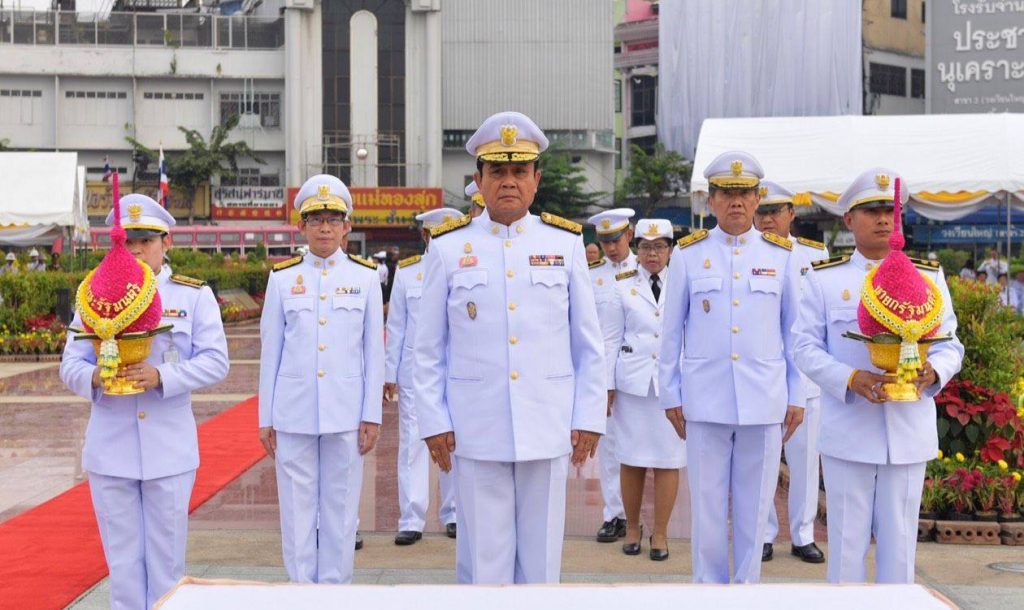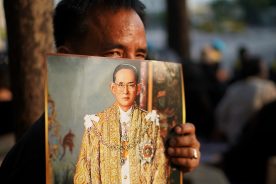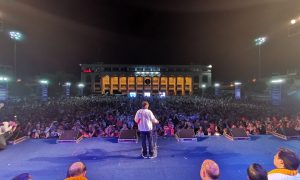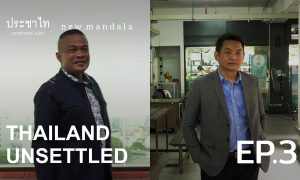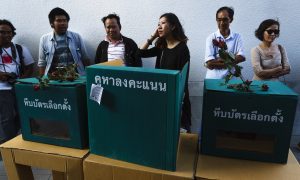With Thailand’s elections approaching on 24 March, Prayuth Chan-ocha seems set to stabilise his political hold over the country by indirectly extending his power via the ballot box. His Phalang Pracharat party has thus far proven to be an able vehicle for National Council for Peace and Order’s (NCPO) interests as it seeks to convert to the appearance of a civilian government. But parliamentary support notwithstanding, it is also in the military where Prayuth has to maintain loyal backing. And in 2019, Thailand’s NCPO is militarily weaker than at the time of the 2014 coup.
The critical period for the junta’s decline was October 2016, the month in which King Bhumibol Adulyadej died. Since October 2016, the junta has begun to lose a principal rationale for remaining in power: guarding an elderly, frail sovereign. Since October 2016, the junta has not had an army commander in place belonging to its own Buraphapayak faction. Since October 2016, the junta has had to contend with the intensifying efforts by up-and-coming officers not part of the junta’s clique to ascend to the army’s senior-most positions.
Finally, and most importantly, since October 2016 the sovereign lording over Thailand’s traditional royal institution has appeared to favour a more direct form of control over the armed forces. That approach involves personalising the selection of senior military officials and reorganising the military itself—both of which mean that the NCPO leaders will lose control over the military, unless they can find a convincing excuse for remaining relevant to the aristocracy.
With the junta leaders’ network of power vis-à-vis the military withering (though still existing), the 24 March election’s charade democracy represents the need for Prayuth to reinvent himself and establish a form of electoral legitimacy as a means of sustaining power for him and his aristocratic allies. But whether he extends his power following an election or remains as junta chief, his future may be limited. With most Thais exhausted with the NCPO in 2019, Prayuth is no paladin of popularity. What is more, history shows that Thailand is coup-prone. If Thailand’s regal institution loses patience with him, the army—shorn of most junta loyalists in command positions—could easily become restless.
Note: It must be remembered that in Thailand the most powerful security service is the army, which enjoys the lion’s share of the budget. In 2019 this has not changed. When this article mentions the military or armed forces, readers should remember that concentration is placed on the army.
Prayuth at his prime
The rise of the current junta leaders began back in 2004, when the hand-picked military leadership under then Prime Minister Thaksin Shinawatra was suddenly faced with the exacerbation of insurgency in Thailand’s Deep South. Thaksin reluctantly promoted Privy Council Chair Prem Tinsulanond’s choice of General Prawit Wongsuwan as army chief. In 2005, Prawit’s pre-cadet academy class peer Sonthi Boonyaratklin succeeded Prawit. But the 2006 coup against Thaksin was carried out mostly by the army’s First Army Region (in charge of Bangkok and central Thailand) under General Anupong Paochinda, not Sonthi.
When Sonthi retired in 2007, Anupong, with the backing of Prem, succeeded him. A disciple of Prawit, Anupong purged most of the senior army officials, substituting them with his own loyalists. Prawit and Anupong were both members of the Buraphapayak (Eastern Tigers) faction, the namesake of the Second Infantry Division. Within Buraphapayak is the Taharn Sua Rachanee (Queen’s Tiger Guards), the factional nickname of the 21st Infantry Regiment of which Anupong and his deputy Prayuth belonged. From 2007 until his retirement in 2010, Anupong succeeded in consolidating his personal and factional power over the army given that, as an active-duty officer, he could constantly purge and appoint officers beneath him. Anupong was assisted by Prawit, who served as Defence Minister in 2009–11.
In 2010, Anupong’s protégé Prayuth succeeded him. Prayuth continued to oversee the entrenchment of his faction’s control over the army. Doing so necessitated that each year the army’s “Five Tigers”—the commander (himself), deputy commander, chief of staff and the two assistant commander positions, as well as the leadership positions of the four regional commands—were constantly filled by officers sufficiently loyal to Prayuth. In addition, especially in the First Army Region, it was often essential that deputy command postings were held by loyalists.
A strategy of sharing army authority was commonly used to co-opt other factions under Prayuth’s command. Beginning in 2010, Prayuth’s Buraphapayak/Taharn Sua Rachanee (B/TSR) faction began to allow Wongthewan (Divine Progeny), the army’s then second-leading faction, to hold a certain number of key army slots, though the amount was less than B/TSR. In 2010–11, Wongthewan held the First Army Region Command. 2011–12 saw B/TSR return to control the position. 2012–13 was again Wongthewan. 2013–14 again was Wongthewan.
By 2014, B/TSR had dominated Thailand’s army for seven years. Prayuth had himself served as army chief for four years. The last army commander to serve longer was General Praphas Charusatien, who held the post from 1964 to 1973. Suffice it to say that by 2014 Prayuth enjoyed rock solid military control, though his army entrenchment owed also to backing from Prawit Wongsuwan and more royalist military elements.
Junta Linkages with Senior Army Leadership (2013–19)
| Junta Chief and PM | Deputy Junta Chief, Deputy PM, and Defense Minister | Army Chief | Deputy
Army Chief |
Chief of Staff | Assistant Army Chief 1 | Assist. Army Chief 2 | First Army Chief | |
| 2013-2014 | May 22, 2014/
Prayuth Chanocha (B/TSR) |
May 22, 2014/
Prawit Wongsuwan (B) |
Prayuth Chanocha
(B/TSR) |
Udomdej
Sitabutr (B/TSR) |
Aksara Kerdphol
(Prem) |
Chatchai Sarikulya
(Prayuth) |
Paiboon Kumchaya
(Wongthe-wan) |
Teerachai Nakwanich
(B) |
| 2014-2015 | May 22, 2014/
Prayuth Chanocha (B/TSR) |
May 22, 2014/
Prawit Wongsuwan (B) |
Udomdej Sitibutr
(B/TSR) |
Chatchai Sarikulya
(Prayuth) |
Chat-chalerm Chalerm-suk
(Prawit) |
Teerachai Nakwanich
(B) |
Preecha Chanocha
(Prayuth) |
Kampnat Ruddit
(Wongthe-wan) |
| 2015-2016 | Prayuth Chanocha
(B/TSR) |
Prawit Wongsuwan
(B) |
Teerachai Nakwanich
(B) |
Walit Rojanapakdi
B/TSR |
Pisit Sitisarn
(B) |
Kampnat Ruddit
(Wongthe-wan) |
Chalerm-
chai Sittisart (Special Forces) |
Teppong Tiipyachan
(B/TSR)
|
| 2016-2017 | Prayuth Chanocha
(B/TSR) |
Prawit Wongsuwan
(B) |
Chalerm-
chai Sittisart (Special Forces) |
Pisit Sitisarn
(B) |
Sasin Thong-pakdee
(Prawit) |
Theppong
Tippayajan
(B/TSR) |
Somsak Binbanjetkul
(Prayuth) |
Apirat Kongsom-
pong (Wongthe-wan) |
| 2017-2018 | Prayuth Chanocha
(B/TSR) |
Prawit Wongsuwan
(B) |
Chalerm-
chai Sittisart (Special Forces) |
Sasin Thong-pakdee
(Prawit) |
Natapol
Nakpanit (Chalerm-chai) |
Apirat Kongsom-
pong (Wongthe-wan) |
Weerachai Intusophon
(B)
|
Kukiat Sinaka (B) |
| 2018-2019 | Prayuth Chanocha
(B/TSR) |
Prawit Wongsuwan
(B) |
Apirat Kongsom-
pong (retires in 2020) (Wongthe-wan) |
Natapol
Nakpanit (Chalerm-chai) |
Teerawat
Bunyawat (Chalerm-chai) |
Kukiat Sinaka
(B/TSR)
|
Wijak Sirbansop
(Prawit) |
Narong-phan Jitkhaew-thae
(Wong-the- Wan) |
B = Buraphapayak faction (in blue)
B/TSR = Buraphapayak/Taharn Sua Rachanee faction (also in blue)
Thailand’s May 2014 coup represented a U-turn back to 2006 for the army as an institution and Prayuth as army commander. Rather than hand over the reins of the prime minister’s office to a civilian, as General Sonthi had done in 2006 and General Suchinda Kraprayoon in 1991, Prayuth concentrated power in himself. He simultaneously holds the position of junta leader and appointed prime minister, while he doled out the secondary posts of deputy junta chief, deputy prime minister and defence minister to his mentor Prawit. Not since 1973 has such administrative power been monopolised by two persons (at the time Generals Thanom Kittikachorn and Praphas Charusatien).
At the time, the army commander administered the country via the Martial Law Act of 1914 (Sections 4, 7). Moreover, the 2014 coup group was enthusiastically supported by the Privy Council and leading aristocrats deeply connected to the country’s traditional institution. Meanwhile, Thailand’s populace was divided. The vast majority of the urban middle and upper classes opposed Thaksin Shinawatra, while the mostly rural poor supported him. So in 2014 the military was united, the aristocracy supported the junta, and civilians were divided. Such a situation was conducive to junta longevity.
The ascension of General Apirat
Yet since the coup, the junta’s organisational control over the military has diminished. This initially occurred following the retirement of Prayuth himself from the position of army chief in October 2014. Once retired, officers no longer have official, direct control over troops. Prayuth and Prawit, in their roles as junta leaders and cabinet ministers, can only give indirect orders to soldiers. Of course, as retired senior brass, they still maintain informal networks of control. But it was necessary for Prayuth to pass on official active-duty control over the army to highly trusted subordinates.
As such, Prayuth appointed General Udomdej Sitabutr to succeed him as army chief. Udomdej had been a long-trusted friend of Prayuth since they fought against the Vietnamese together during the 1980s. Yet despite Udomdej’s loyalty, the junta could not be sure about future army chiefs. This was one reason behind the NCPO’s invocation in March 2015 of Article 44 of the 2014 charter, which enshrined into law the power of the junta leader “to order, restrain, or perform any act [which] shall be deemed lawful and constitutional under this Constitution, and shall be final”. Article 44 gave the junta leader— now retired army commander—continuing martial supremacy, even over the army chief.
The junta also assumed the strategy of appointing B or B/TSR army chiefs for single year terms, with the brevity of the command appointment intended to dissuade commanders from acting independently of the Prayuth/Prawit duo. This can be seen with Udomdej (2014–15) followed by General Teerachai Nakwanich (2015–16). The promotion line would have proceeded (with Teerachai retiring in 2016 to make way for General Pisit Sitisarn who retired in 2017, followed by General Theppong Tippayarachan who retired in 2018 and so on).
But the October 2016 death of the then Thai monarch stymied the domination over the army by Buraphapayak and Buraphapayak/Taharn Sua Rachanee. General Chalermchai Sittisart (Special Forces faction) won out against Pisit to become army commander, though Pisit got the deputy post (Theppong received an assistant army chief position). Buraphapayak at the same time lost control over the First Army Region when Wongthewan faction’s General Apirat Kongsompong, an arch-royalist with close ties to the palace, was appointed to that post.
Chalermchai is closer to Privy Councilors Prem and Surayud Chulanond than he is to Prayuth and Prawit. His appointment represented a stopgap while Apirat continued to ascend in the army. Under Chalermchai, the army began to witness more changes in top army leadership positions. For example, General Natapol Nakpanit, a Chalermchai protégé, in 2017 became army chief of staff and in 2019 continues on as deputy army chief.
In October 2018, Apirat succeeded Chalermchai as army chief, an event which also represented a weakening of control by Prayuth and Prawit—as reflected in B and B/TSR—over the army. Since Apirat’s appointment, his control over the army has been immense. Of the Five Tigers positions, only chief of staff General Teerawat and assistant chief General Weejak Siribansop do not belong to Apirat’s pre-cadet Class 20. None of the Five Tigers retires after Apirat, who retires in 2020. Only Assistant Army Chief General Kukiat Sinaka is a member of B/TSR. 3 out of 4 of the army region commanders currently belong to pre-cadet Class 20. The cohesion of class comradeship could facilitate any joint decisions by senior brass, even potentially against governments.
Within the First Army Region—strategic for coups as it guards Bangkok—Wongthewan faction has enjoyed enhanced control since the mid-year army reshuffle of 1 April 2018. That day saw the promotion of General Wongthewan faction member Narongphan Jitkhaewthae from the First Division King’s Guard to the post of Deputy First Army Commander. Narongphan’s promotion cut out the rise of General Wuttichai Nakwanich, the younger brother of the still-influential former Army Commander and then Privy Councilor General Teerachai Nakwanich (Teerachai is a member of Buraphapayak and is close to Prawit rather than Prayuth).[1] Replacing Narongphan as First Division King’s Guard Commander was General Songwit Noonpakdi (pre-cadet 23), son of former Army Chief General Issarapong Noonpakdi and close to General Apirat. Six months later, in October 2018, Narongphan was appointed as First Army Region Commander.
Thailand’s first elections in the post-Bhumibol era
On the prospects for a durable authoritarian politics after the 'Bhumibol Consensus'.
But Narongphan is close to Apirat, is rumored to be favored by Thailand’s traditional royalist institution, and is backed by Songwit, who is likely to become a Deputy Commander in the First Army Region in April 2019. Narongphan could well become Army Commander upon Apirat’s 2020 retirement—Narongphan retires in 2023. The point here is that since Apirat’s accession as army chief, control by Wongthewan (the favorite of the palace) over leading army positions looks guaranteed into the future.
Security forces reorganised
Since 2017 under Chalermchai, Thailand’s military has been undergoing organisational renovations. Most importantly, units other than an enlarged First Infantry Regiment began to be moved from Bangkok to neighbouring provinces. This includes the 11th Infantry Regiment and the 4th Cavalry Battalion. In fact, the First Infantry Regiment is being merged into a new royal capital command, which is under the direct control of the palace rather than the army chief, junta leader or defence minister. This transformation is supposed to be completed before Apirat retires in 2020 and would immediately diminish the influence of NCPO leaders over Bangkok-based troops on the ground—where coups tend to commence.
One of the most successful mechanisms for the consolidation of junta power has been the Internal Security Operations Command (ISOC), a nationwide political leviathan (originally a machine combatting communism) through which the army has since 1965 pressed its interests, preferences and control under the guise of promoting national security. ISOC has merged officials of the Defence Ministry, police and Ministry of the Interior. Though Prayuth as prime minister is technically the director of ISOC, he has generally allowed Prawit, as deputy prime minister, to do the director’s formal duties. The deputy director of ISOC is the army chief and the assistant director is the army’s deputy chief (currently General Natapol Nakpanit), the person who tends to really run ISOC’s day-to-day activities.
Under the Internal Security Act (2008), each of the army’s four regional commanders direct regional-level ISOC committees. In 2017, there was also an unprecedented reshuffle of all provincial-level leading ISOC military officials. The revamp formally enhanced the power of provincial-level ISOC commanders above each of the civilian governors. Today, ISOC allows the junta to exert control at the national, regional and provincial levels, with army officials dictating at each one.
As such, ISOC could facilitate junta control over the administration which emerges from the 24 March election. Still, the fact that the junta controls ISOC indirectly through the army chief means that Prayuth and Prawit are dependent upon Apirat for their continued supremacy in the institution.
Meanwhile, the NCPO has sought to enshrine its authority over police, most of whom in the past had been sympathetic to Shinawatra-led governments. Prayuth implemented Order 13/2559, which bestows police powers under the Criminal Code and Criminal Procedures Code upon military officials, or military-directed paramilitaries, from the rank of sub-lieutenant and higher. Such powers include the authority to summon, arrest and detain people suspected of illegalities without judicial due process of law on 27 different forms of crimes from robbery to loan sharking to prostitution. The decree deputises soldiers as police, while giving greater legal impunity to army officials as opposed to police. The decree even allows military officials to arrest police as part of law-enforcement procedure. With the law granting military (especially army) officers combat and policing powers, it legally allows them to prevail over police as the leading security officials in Thailand.
The junta must have assumed that enshrining army power over police power would guarantee army support for NCPO rule. But if a soldier not from the junta leaders’ faction was appointed as army commander—as in the case of Chalermchai and Apirat—his loyalty could not necessarily be guaranteed.
Conclusion
After five years of leading the NCPO, Prayuth’s backing in the military has not strengthened. In 2019, the NCPO’s authority within the armed forces has simply become more precarious, given the decline in the NCPO leaders’ network of power vis-à-vis the military. Going forward, parameters have been placed on the leverage available to Prayuth over the armed forces, whether he dominates a prospective post-election government or even if the junta remains.
If the NCPO is unable to continue dominating the military, then the armed forces may be facing either a period of intense, turbulent military factionalism or an unprecedented move towards unity as personalised under the country’s new sovereign. But regardless of the NCPO’s diminishing preeminence, Thailand’s military is going nowhere. Despite efforts by civil society to diminish its political clout, it will persist as a leading institution with a monopoly on violence across Thailand’s political landscape.
[1] In June 2018, Teerachai stepped down from the Privy Council, in which he had served since 2016. Meanwhile, Teerachai’s other brother Piyawat was never promoted beyond 4th Army Commander but retired in October 2018. The Nakwanich brothers may have run afoul of someone in Thailand’s highest and most traditional institution.
 Facebook
Facebook  Twitter
Twitter  Soundcloud
Soundcloud  Youtube
Youtube  Rss
Rss 